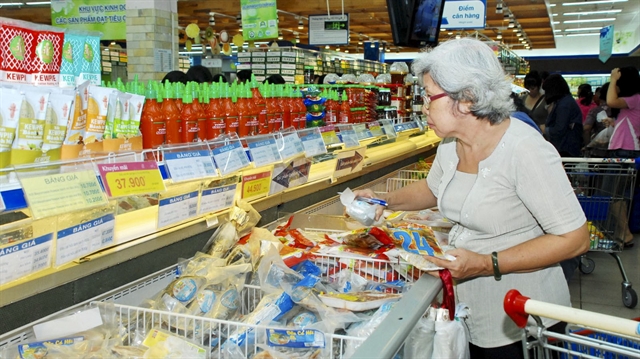 Economy
Economy

Vietnamese and Korean researchers have published a report on co-operation policy and ways to boost the competitiveness and growth of the Vietnamese sector.

|
| A customer looks goods at a modern supermarket. Việt Nam needs to balance between modern and traditional distribution channels. Photo tapchicongthuong.vn |
HÀ NỘI – With the rapid development of the domestic market, Việt Nam needs to balance modern and traditional distribution channels, according to experts.
The insiders were speaking at a seminar on co-operation in the distribution industry between Việt Nam and South Korea held in Hà Nội on Wednesday by Việt Nam’s Ministry of Industry and Trade (MoIT) and the South Korean-based Reshaping Development Institute (ReDI).
The event was part of co-operation between MoIT and ReDI to implement the Capacity Building Project for Inclusive Development of Việt Nam's Distribution Industry (LOTTE-KOICA project).
Speaking at the seminar, Trần Duy Đông, head of the MoIT's Domestic Markets Department, said as part of a project on developing Việt Nam’s distribution industry, a group of Vietnamese and Korean researchers have published a report on co-operation policy and ways to boost the competitiveness and growth of the Vietnamese sector.
According to the group, the core issue that challenges the development of the industry is a conflict between the modern and large-scale distribution system and the traditional market model.
Đông said the MoIT will continue working to modernise the distribution industry and balance the modern and traditional systems.
To develop and manage the domestic distribution industry, besides finding a harmonised solution on development between large enterprises, including foreign invested enterprises, and millions of small- and medium-sized enterprises, the experts suggested it is necessary to pay attention to the role of traditional markets.
Speaking at the seminar, Nguyễn Thanh, Director of Thừa Thiên - Huế Province’s Department of Industry and Trade, said traditional markets face difficulties related to outdated infrastructure as well as food safety and product origin problems.
Consumers, particularly in urban areas, are switching to shopping at malls and buying products online, causing the system to become stagnant, he added.
Thanh said there is a need for investment in improving these markets’ infrastructure and developing professional operations and services at wholesale markets.
Capacity training for market managers and technology training among sellers are also necessary, he said.
Đông said Việt Nam's retail market has been developing strongly due to the advantage of a large population at more than 90 million people, of which young people account for a high proportion. Besides that, the domestic economy is recovering with rapid growth.
By using technology in the retail sector, the domestic retail market is becoming more attractive with many kinds of distribution channels.
A representative of South Korea’s Ministry of Industry, Trade and Energy said that after nearly 30 years of establishing co-operation, South Korea is the second largest trade partner and the largest investor to Việt Nam.
Korean distribution enterprises, including LOTTE Mart, invested in Việt Nam 10 years ago with the scale of US$1 billion and the enterprises have maintained a strong investment.
Many large supermarkets have entered the Vietnamese market, becoming businesses that play an important role in the development of the distribution industry in Việt Nam, the representative was quoted by Công thương (Industry and Trade) magazine as saying. — VNS




